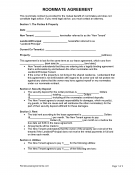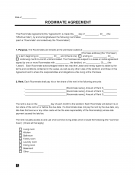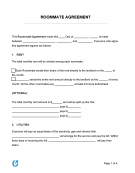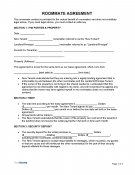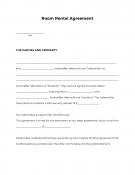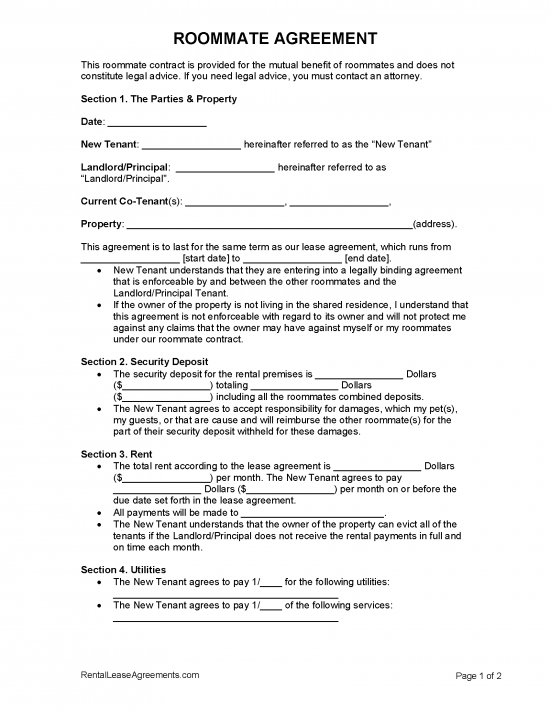A roommate agreement is a contract between the occupants of a shared residence. Each roommate agrees to lease a room or bed for monthly rent. The roommates may also incorporate house rules such as quiet times and when guests are allowed on the premises. A roommate agreement can either be with a tenant or the landlord on the property.
- Names of all current roommates;
- Landlord’s name;
- Monthly rent ($);
- Fees for utilities;
- Cleaning times;
- Quiet times;
- Rules for guests;
- Sleepover rules;
- Rules for pets; and
- Smoking policy.
Table of Contents
- Roommate Agreements: By State
- Roommate Agreements: By Version (5)
- Roommate Agreement vs Sublease
- How to Evict a Roommate (7 steps)
- Frequently Asked Questions (FAQs)
By State
- Alabama
- Alaska
- Arizona
- Arkansas
- California
- Colorado
- Connecticut
- Delaware
- Florida
- Georgia
- Hawaii
- Idaho
- Illinois
- Indiana
- Iowa
- Kansas
- Kentucky
- Louisiana
- Maine
- Maryland
- Massachusetts
- Michigan
- Minnesota
- Mississippi
- Missouri
- Montana
- Nebraska
- Nevada
- New Hampshire
- New Jersey
- New Mexico
- New York
- North Carolina
- North Dakota
- Ohio
- Oklahoma
- Oregon
- Pennsylvania
- Rhode Island
- South Carolina
- South Dakota
- Tennessee
- Texas
- Utah
- Vermont
- Virginia
- Washington
- West Virginia
- Wisconsin
- Wyoming
By Version (5)
Download: Adobe PDF, MS Word, Rich Text Format
Roommate Agreement vs. Sublease
A roommate agreement is:
- Between the roommates and the landlord.
- Is shared.
- Must adhere to the house rules.
A sublease is:
- Between the tenant and the landlord.
- Can be shared or the whole space.
- Must adhere to the master lease.
How to Evict a Roommate (7 steps)
- Step 1 – Giving an Eviction Notice
- Step 2 – Waiting for the Notice Period
- Step 3 – Filing a Complaint and Summons
- Step 4 – Serving the Roommate
- Step 5 – Going to Court
- Step 6 – Obtaining a Writ of Possession
- Step 7 – Sheriff Removes Roommate
To evict a roommate the person authorized in the roommate agreement will have to follow their State eviction process.
Step 1 – Giving an Eviction Notice
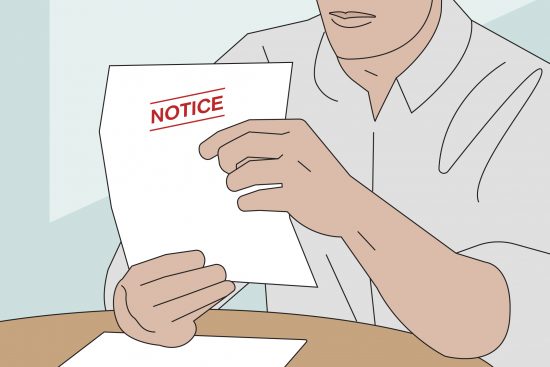
The managing roommate or landlord will be required to give legal notice to the roommate. Whether for breaking the lease for non-payment or violating a clause in the roommate agreement, the tenant must be made aware in writing of their fault.
Step 2 – Waiting for the Notice Period

The roommate has the State-required notice period to respond to the notice. If they cure the issue, then the roommate agreement is valid as if no violation occurred. If the roommate does not cure the issue and does not vacate the property, they will be liable to a lawsuit against them.
Step 3 – Filing a Complaint and Summons
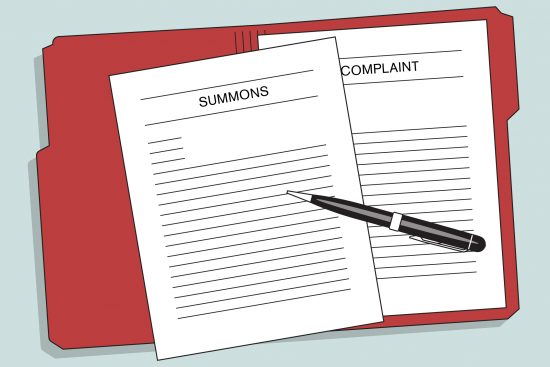
The roommate authorized to act on the property will be able to file a lawsuit in housing court where the property is located. The two (2) forms needed to be filed are often called a “Complaint” and “Summons.” There may also be a cover page that the court requires. It’s best to speak with the clerk’s office for the information about filing and the required fee.
Step 4 – Serving the Roommate
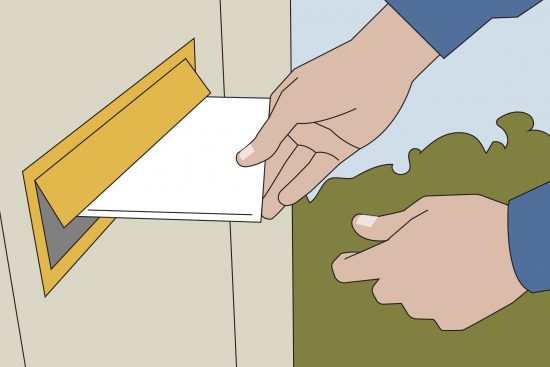
After serving the roommate, they will have usually between 15 to 30 days to file an Answer. This is the official response to their defense against the eviction.
Most roommates fail to file an Answer and remain in the unit until the end of the eviction process.
Step 5 – Going to Court

A court hearing will be served to both parties and required to attend. At the hearing, the judge will go over the complaint and the roommate’s Answer. Any testimonies will be presented and a judgment will be made.
Step 6 – Obtaining a Writ of Possession
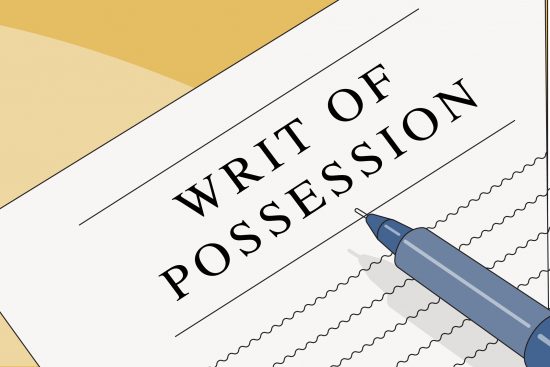
With the judgment a Writ of Possession may be applied for with the Court Clerk’s office. After obtaining, the Writ of Possession may be used to send to a Sheriff to remove the roommate from the premises.
Step 7 – Sheriff Removes Roommate

The Sheriff will wait for a time for the roommate to leave the premises and change the locks on the property. The current roommates will receive new keys and the evicted roommate will have to make a time to get their remaining possessions.
Frequently Asked Questions (FAQs)
- What if a roommate abandons the tenant?
- Are roommate agreements legally binding?
- Does a roommate agreement need to be notarized?
- Is it legal to check the credit report of a roommate?
- Can a roommate agreement prohibit firearms?
- Can you charge a security deposit for a roommate?
What if a roommate abandons the tenant?
If a roommate abandons the tenant when a written agreement has been signed then the tenant can sue the roommate in Small Claims Court. If there is no agreement then there is no legal course of action for the tenant.
When suing the abandoned tenant, it is best to file a complaint in the local Small Claims Court which can be handled without an attorney.
Are roommate agreements legally binding?
A roommate agreement is legally binding and governed under the landlord-tenant laws located in that specific State.
Does a roommate agreement need to be notarized?
No, a roommate agreement does not need to be notarized. It can be signed by handwriting or electronically at DocuSign (paid) or eSign.com (free).
Is it legal to check the credit report of a roommate?
Yes, as long as the person checking the roommate’s credit has their consent via a rental application.
Can a roommate agreement prohibit firearms?
Yes, a roommate agreement can prohibit firearms as well as other items not wanted by the residents.
Can you charge a security deposit for a roommate?
Yes, a security deposit can be charged no more than the maximum allowed in the State. It is common to charge a roommate the equivalent of one (1) month’s rent.
